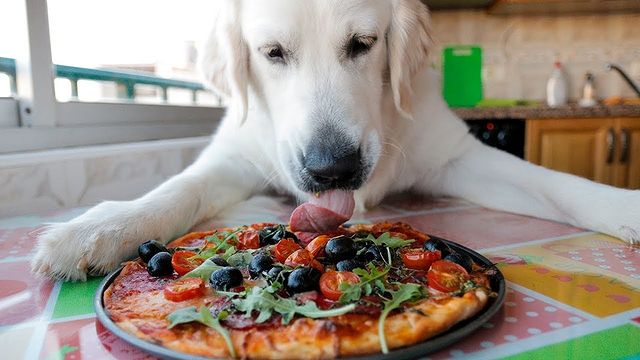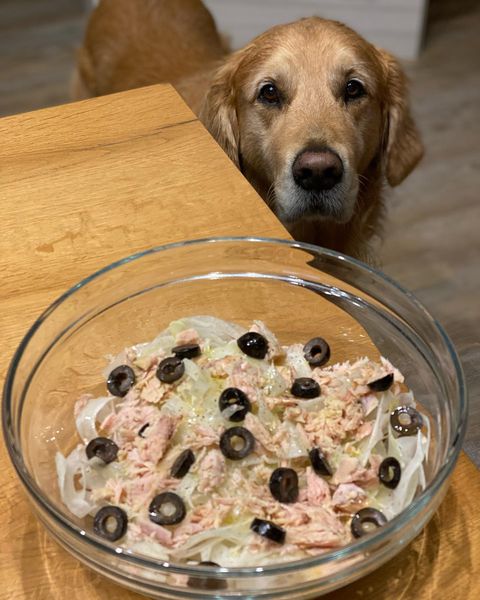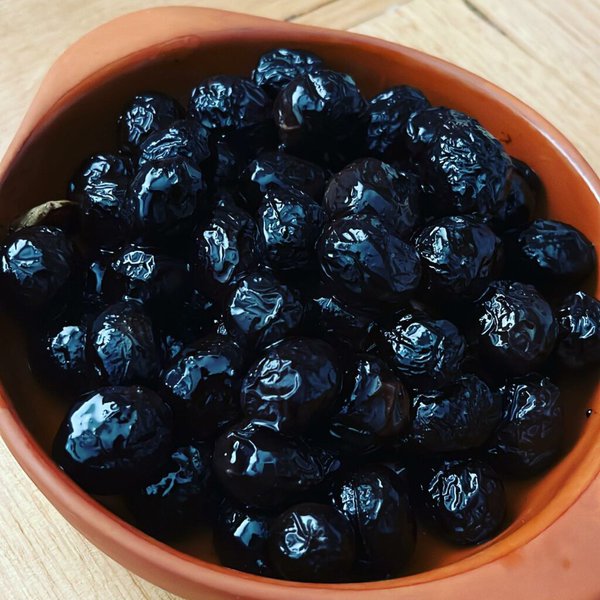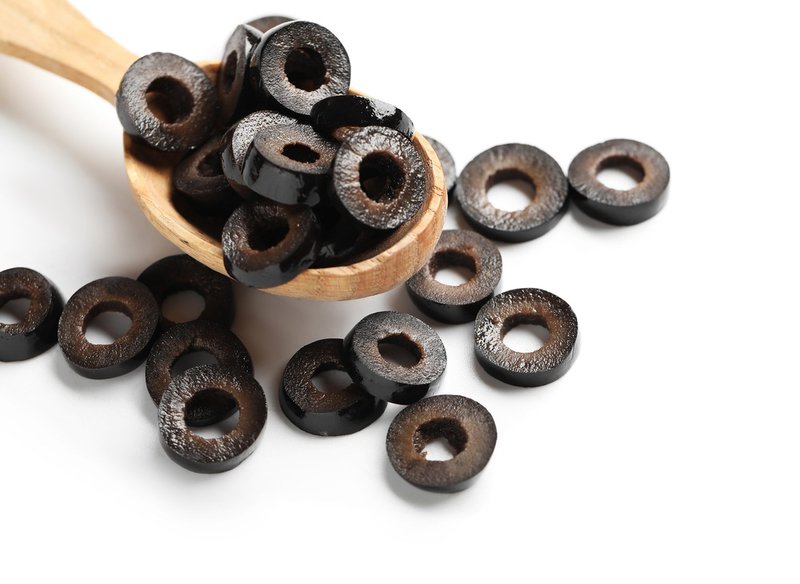You may sometimes want to share some of your favorite snacks or treats with your dog. If you’re a fan of hors d’oeuvres or cocktails, you may wonder if you can safely share black olives with your loyal fur friend. But can dogs eat black olives?
Yes, dogs can eat black olives in moderation. Black olives are packed with essential nutrients that help keep your dog healthy and happy. They are also loaded with vitamins, proteins, antioxidants, and minerals necessary for cell growth and maintenance. Moreover, the fatty acids in black olives aid digestion and help maintain a healthy coat and skin.
This article includes all you need to know about feeding your dog black olives: their benefits to dogs, the ideal serving size, and how to safely prepare black olives for dogs. So, let’s explore why black olives make an excellent treat for your furry friends! To start, we’ll review in detail the many nutrients in black olives.
What Do Black Olives Do For Dogs?

Black olives are beneficial for doggies because they contain many nutrients, including vitamins, minerals, antioxidants, and fatty acids. Black olives also have digestive benefits, making them a perfect snack to share with your best fur friend.
While some may consider black olives human food, these tiny fruits also offer significant health benefits for pups. So your pooch can enjoy the health benefits and the flavor of black olives!
If your dog tries to sneak food from your plate, it is okay to feed it one black olive or two. Black olives contain vitamins that can boost your pup’s health and energy. However, offering black olives in moderation is best.
There are several ways black olives can benefit dogs:
A Source Of Nutrients
Black olives contain essential vitamins and minerals that help keep your pup healthy, such as healthy monounsaturated fatty acids and antioxidants.
Vitamins
Black olives contain various essential vitamins, including vitamins A and E, which help dogs absorb other vitamins and minerals while supporting healthy skin and coats. They also help maintain optimal eye health and build strong bones, teeth, and muscles.
Minerals
Black olives are a great source of many minerals, including calcium, copper, and iron. Iron supports healthy red blood cell production and helps to maintain normal muscle and nerve function. Calcium is essential for strong bones and teeth and for regulating muscle contractions. Copper helps to produce energy and strengthen the immune system.
Healthy Fatty Acids
Black olives are an excellent source of healthy fats, mainly oleic acid and omega-6 fatty acids. These fatty acids help support a healthy heart and skin. They also help to reduce inflammation and support the immune system.
Antioxidants
Black olives are rich in antioxidants, such as polyphenols and flavonoids, which can help protect against oxidative damage from free radicals. These compounds have been linked to various health benefits, including boosting immunity, reducing inflammation, improving liver function, and fighting bacteria and viruses.
Digestive Benefits
Black olives are high in dietary fiber, which helps promote regular bowel movements, prevent constipation, and maintain healthy digestion. Additionally, fiber can help reduce stomach upset, bloating, and other digestive issues in your pup.
Are Black Olives Safe For Dogs?
Yes, black olives are generally safe for dogs in small quantities. However, it is essential to remember that olives can cause health risks, such as heart disease, vomiting, stomach pain, and diarrhea in dogs if consumed in large quantities.
Black olives are low in fat and sodium, and they contain no toxic ingredients, making them a healthy snack option for canines. But giving your pet more than the average amount of black olives per day may lead to serious health problems, weakening your friend’s immunity.
Your dog can become weak and lose the strength to play or even walk with you. Also, if your dog is allergic to any olives, avoid feeding your dog olives.
Some of the health risks associated with dogs eating too many black olives are listed below:
Stomach Pain

If your pup is sensitive to the salinity of olives, it may experience discomfort and mild cramping. Symptoms range from feeling bloated to having difficulty passing stool.
Vomiting
The oil in black olives could cause an upset stomach, leading your doggie to vomit. In addition, ingesting too much salt can cause vomiting because too much salt can be challenging for dogs to digest.
Diarrhea
Black olives are high in fat, making it difficult for your dog’s digestive system to process food. Consequently, high fat can lead to loose stools or even bloody diarrhea in some cases.
Heart Disease
Feeding black olives to your canine buddy consistently may increase the risk of heart disease. This is because olives are high in sodium, which can cause problems for a dog’s cardiovascular health. Too much sodium can increase blood pressure and fluid retention, putting strain on the dog’s heart.
How Many Black Olives Can A Dog Eat?
A good rule of thumb is to give dogs only 1 to 2 whole olives per day, depending on the size and weight of your dog. If you give dogs sliced or canned olives, reduce the amount by half.
It can be tempting to share table scraps with your four-legged friend, but it’s important to research which foods are safe for your pup. For example, while some people may consider black olives harmless, there is a correct amount to feed your dog.
The correct amount of black olives addresses the essential needs of your dog’s body for proper growth and maintaining health benefits. We highly recommend checking the ingredients list for all your pup’s food. Many commercially prepared products may contain potentially harmful ingredients.
For example, don’t give your fur friend garlic-seasoned black olives, as garlic may increase health risks. Instead, give your dog raw, plain, or unsalted black olives to prevent problems.
Can A Small Dog Eat Black Olives?

Yes, small dogs can enjoy black olives too. There are some benefits to feeding your small pup black olives. They provide monounsaturated fatty acids, fiber, minerals (iron, copper, and calcium), and dietary fibers. However, it’s also essential to consider the potential risks.
Black olives are high in sodium, so if you feed your pup these tasty treats, be sure to do so in moderation. Additionally, only feed dogs pitted olives to avoid any choking hazards. Finally, watch for signs of digestive upset, such as vomiting or diarrhea, after your pup consumes black olives.
Next time you reach for a snack at the store, don’t forget black olives are a healthy treat for your pup! Black olives are not only tasty and nutritious but also nutritional and beneficial for dogs’ health.
If your furry friend doesn’t like the taste of the black olives, don’t force them to eat them, though. If you have doubts about whether your dog should eat black olives, consult your veterinarian before giving olives to your pet.
Can Dogs Eat Pitted Black Olives?
Giving your dog pitted black olives is not recommended because they pose a choking hazard. Always consider your breed’s size and airway if you want to feed your furry friend black olives.
While pitted black olives may not have any apparent dangers for your pup, there are severe health risks associated with feeding pitted olives to dogs.
Black olive seeds can damage your dog’s airway tract or cause dental problems. Even pitless olives can become stuck in a tiny dog’s throat and obstruct breathing since their teeth may not effectively crush them.
That’s why we suggest that black olives should always be cut into smaller pieces or mashed up before being given to your pup.
Can Dogs Eat Black Olives In Brine?

No, avoid feeding your four-legged friend black olives in brine. In brine, black olives contain high sodium, which can be harmful and cause serious diseases.
Risks Of Sodium For Eating Black Olives
Black olives are naturally high in sodium, which can be dangerous for a canine’s health. When dogs ingest it in large amounts, sodium can cause:
- Hypernatremia (too much salt)
- Heart Diseases
- Dehydration
- Electrolyte imbalance
- Kidney failure
- Seizures





